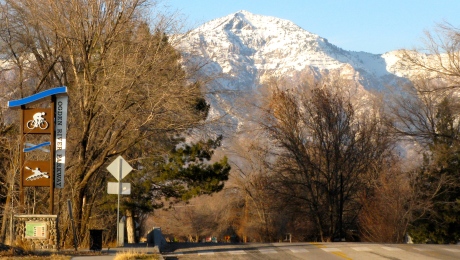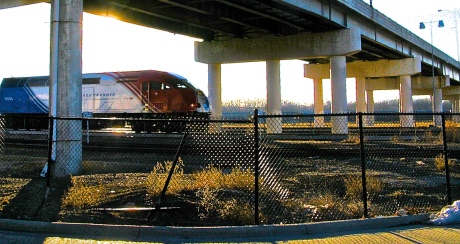
DeVoto’s mother had died. He was an unemployed Phi Betta Kappa and a Veteran, living at home with his father. Two years of turmoil ensued as he fell in and out of love with local girls, worked at any kind of job he could get, and struggled to write a novel, ultimately realizing it was hopeless and destroying the manuscript. Wallace Stegner describes the two-year ordeal in his biography, The Uneasy Chair:
In the late summer of 1920, in one half of a nondescript duplex house at 2561 Monroe Avenue, one of Ogden’s most gifted sons was undergoing a nervous breakdown. What had begun as insomnia and eye trouble had gone on to migraines that split his head like a watermelon and brought on fits of agonized vomiting, and from there to deep depression, helplessness, and panic.
In a letter to a college friend DeVoto wrote:
Do not forget that at best I am a spore in Utah, not adapted to the environment, a maverick who may not run with the herd, unbranded, given an ill name. These people are not my people, their God is not mine.
DeVoto worked part-time at Spargo’s bookstore on Washington Blvd. He sometimes wrote unsigned reports for the Ogden Standard. He started another novel and he joined the American Legion. According to letters written years later to Katherine Sterne, he got a job as head of Weber County Democrats and made an abortive attempt at becoming a local power broker.
DeVoto and Sterne never met, but over the course of eleven years, their correspondence was the equivalent of 2,500 single-spaced, typewritten letters. Published in 2012 by the University of Utah, The Selected Letters of Bernard DeVoto and Katherine Sterne reveal a DeVoto not seen in his published work. Kate Sterne was a graduate of Wellesley College and had briefly worked at the New York Times. She young, bright, and beautiful, but tragically institutionalized because of tuberculosis: an ideal correspondent with whom DeVoto could share his private doubts, his struggles, his triumphs. Although it would have been possible for DeVoto to make the journey to upstate New York to see her in person, DeVoto preferred keeping it a strictly epistolary relationship.
In response to Sterne’s request, DeVoto began a memoir about his post-war years in Ogden, published as an appendix in The Selected Letters as “The Bucolics of Decadence, or Frank Merriwell Among the Common People.” Stegner calls it “autobioloquacious.” Some of it may be based on fact. You could call it a ripping good yarn. The picture DeVoto paints of young military veterans making the most of Post-war politics is markedly different than Stegner’s depiction as DeVoto’s darkest hour. The truth must lay somewhere between Stegner’s portrait of abject despair and DeVoto’s own recollection of cockeyed euphoria.
In July also I got a job as Secretary to the Weber County Democratic Committee at $150 a month and any takings. It being obviously a Republican year there were few takings. I could not speak in public (here the horns sound a theme), but I didn’t need to, except occasionally as extempore introducer. I organized, I publicized, I made deals, I kept records. When our candidate, Jimmy Cox, came to Utah, I traveled across the state with him, he was honoris causa, a Phi Bete brother and we got stinking drunk, some fifty of us on that special train three times a day for nearly a week.
DeVoto was asked to make a speech for the first annual University Club banquet:
All I can remember is that I quoted Jefferson’s Second Inaugural and said that we ought to let Debs and the political prisoners out of jail and repeal the Espionage Act and let the NY socialists take their seats—a lot of platitudes that would have been laughed off anywhere but on Main Street. But, quite innocently, I was a Bolshevik. …Old Simon Bamberger denounced me…Quite literally, I was a dangerous person in Ogden from then on.
By September Party funds were so low that my salary was cut to fifty a month, and part of that promised…One night I was sipping white mule in Jess Holther’s law office, where he had a shiny new desk, a set of that cumulative Reporter that young lawyers buy, and a lot of correspondence from the American Legion. Jess had been Commander for the Herman Baker Post #9 of Utah until he resigned to run for the primaries as County Attorney…
Over a glass of white mule, Jess said, “Come on, Benny, join the Legion.” I had a vision. I saw a way to get back enough respectability to hold a job in Ogden. I said, “OK, Jess. I will.”
The next day I was a member of Herman Baker Post #9 of Utah, American Legion.
“Jess,” our hero said, “we’ve got to get some fun out of this Legion set-up. Or else.”
Knockabout humor ensues, as DeVoto is named Chaplain of the Post and masterminds a scheme to get four hundred new members in a week, making the “DeVoto-Holther machine” a political force. One of their members provides an “inside track with the police department,” ensuring security for subsequent debauches. When “an enormous amount of wonderful liquor from California in a boxcar” is confiscated, DeVoto asks for “half a case of champagne for social purposes and two cases of whiskey for Jess and me.”
DeVoto develops a career advocating for preferential hiring for veterans and becomes more practiced in delivering paid speeches at funerals for veterans, inspired by what seems increasing amounts of white mule.
She gave me several and now I was well primed. Fitz held me fast by the sleeve and led me to the Mayor’s automobile. He got in beside me and held me erect all through the parade and kept jabbing me whenever my head started to fall. The parade ended at a Memorial Avenue of trees along one side of the Ogden Cemetery. This had been another one of my ideas. The Post didn’t pay for those trees—that was the city’s privilege, but we had charge. We had named each box elder after one of the departed buddies, and we had secured a German cannon from the War Department, and now we were going to dedicate both trees and cannon…And by estimate, not less than fifteen thousand people showed up to listen to us.
For better or worse, this fragment of autobiography ends when DeVoto escapes Ogden in 1922 for a job teaching English at Northwestern College in Evanston, Illinois. Everything immediately improved in his life. He met the woman who would become his wife, Helen Avis MacVicar, in his Freshman English Class. She was beautiful, intelligent, outdoorsy, and just as unconventional as Benny, but with all the social skills her husband sorely lacked.
During the five years he spent teaching there, DeVoto discovered real joy in teaching. His aggressive informality was abhorred by some administrators but made him popular with students. His contrarian attitude, bold opinions, and colorful phrase-making came to be known as “the DeVoto way of thinking.”
Married to Avis as soon as classes ended in 1923, the couple honeymooned on Washington Island in Lake Michigan. Three months off between semesters allowed DeVoto to write most of what was to become his third novel, The Crooked Mile,” published in October, 1924. That same year DeVoto became book editor for the Evanston News-Index, for the next three years. He also wrote for the Chicago Post and the Saturday Review of Literature, gaining a national reputation for his strongly-worded reviews. Avis shared the job of churning out book reviews for the Evanston paper, eventually becoming book editor.


